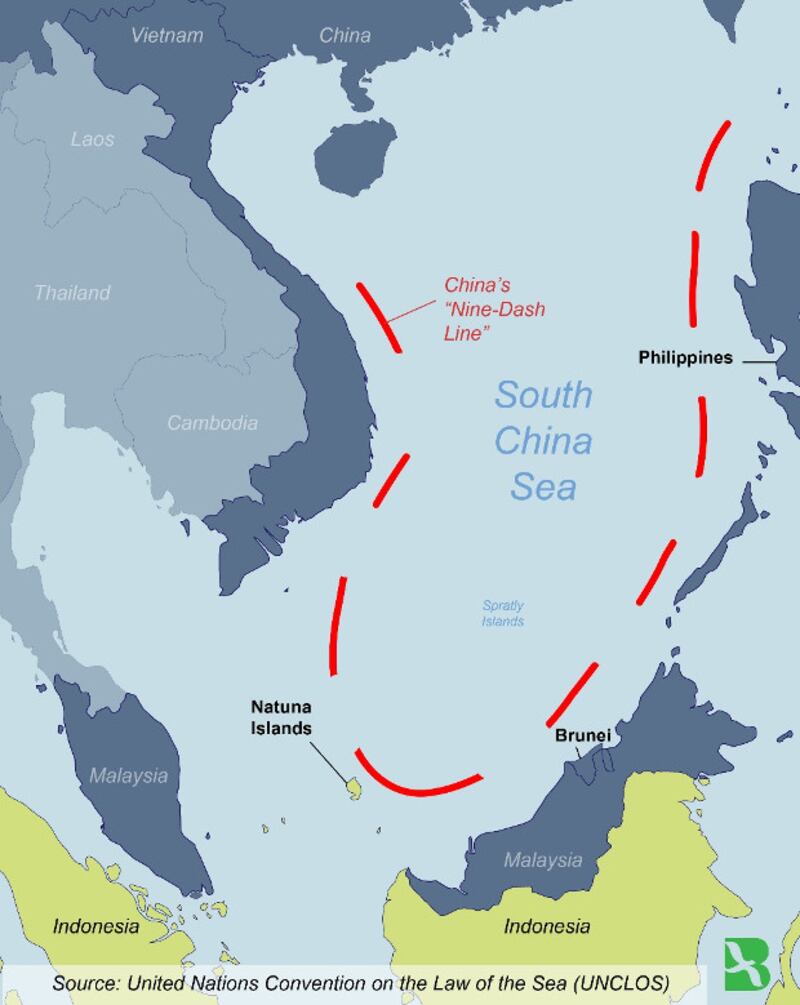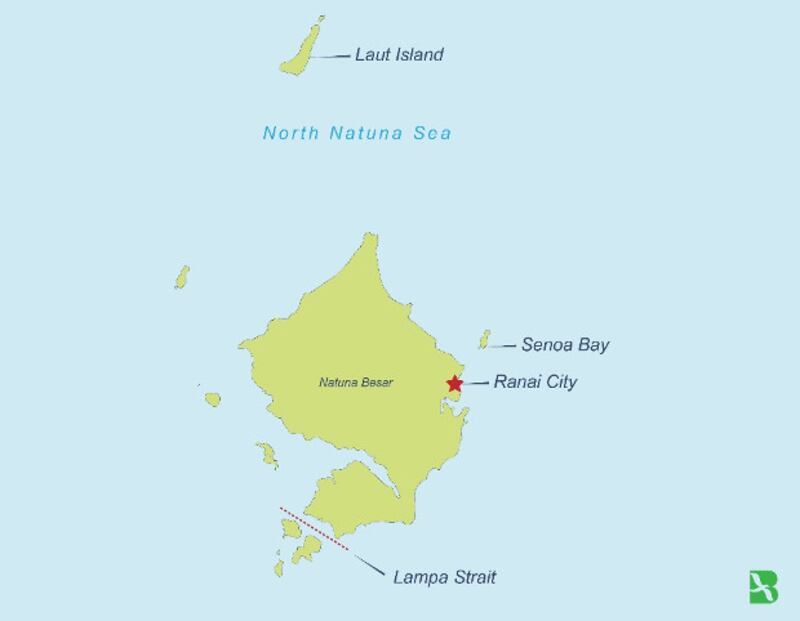Indonesia is boosting patrols in its maritime territory in the South China Sea after incursions by Chinese coast guard and fishing boats in recent days.
The head of Indonesia’s Maritime Security Agency (Bakamla) said the country would defend its waters off the Natuna Islands – an archipelago at the southern reaches of the contested sea – after more than 60 Chinese ships trespassed in its Exclusive Economic Zone (EEZ) in late December.
“We will be present there and we will stake our claim,” Vice Admiral Achmad Taufiqoerrohman, the chief of Bakamla, told reporters after meeting with cabinet ministers in Jakarta on Friday.
“The Indonesian National Armed Forces (TNI) will also exert their strength,” Achmad said.
He did not indicate how many additional personnel or ships would be deployed, saying those details were confidential.
TNI said it had already deployed three ships, one maritime reconnaissance aircraft and an Indonesian Air Force plane to patrol Natuna waters. Another ship was on its way to the region from Jakarta, the military said in a statement.
After Jakarta lodged a diplomatic protest over the December incursion, Beijing’s foreign ministry defended the presence of Chinese boats around the Indonesian islands, saying that “China has rights and interests over the relevant waters.”
Chinese boats including three coast guard vessels were again spotted in Natuna waters on Friday, according to Indonesian media outlet Tempo.
“When we conduct air patrol this morning, we find 30 boats there. I have deployed more security personnel,” it quoted the Bakamla chief as saying.
Gas fields near the islands are believed to hold up to 226 trillion cubic feet of gas, according to data from the Ministry of Energy and Mineral Resources.
Following a series of encounters with Chinese ships in Indonesian waters in 2016, including one in which the Indonesian Navy fired warning shots at Chinese-flagged vessels, Indonesia further irritated Beijing by renaming the area the North Natuna Sea.
Jakarta then launched an ambitious five-point plan for developing the Natunas that involved military facilities, fisheries, tourism, oil and gas, and preserving the environment.
“It is our right to develop the Natuna waters,” Indonesian Foreign Minister Retno Marsudi told reporters on Friday. “We would also like to emphasize again that there have been violations by Chinese vessels in Indonesia’s EEZ.”
Overlapping claims
Indonesia has traditionally not been among countries in the region engaged in territorial disputes over the South China Sea, a strategic waterway through which about U.S. $5 trillion in trade passes annually.
China, through its so-called Nine-Dash Line, claims almost all of the sea, while Brunei, Malaysia, the Philippines, Vietnam and Taiwan have their own overlapping claims to portions of those waters.

In a 2016 ruling on a case brought by the Philippines, the Permanent Court of Arbitration in The Hague said there was no legal basis for Beijing's maritime claims. But China rejected the ruling and launched a building spree in territories it has taken over in the sea.
China’s Nine-Dash Line overlaps with Indonesia’s EEZ in waters off the Natunas, U.S.-based experts on the South China Sea told BenarNews.
Evan Laksmana, a senior researcher at the Jakarta-based Center for Strategic and International Studies (CSIS), said the Natuna waters had been one of Indonesia’s potential flashpoints since the 1990s because of their location in the South China Sea.
“If the military anticipated some form of conflict spillover, from regional countries fighting with each other … the Natunas are among the likeliest or closest scenarios,” Evan told BenarNews.
“In addition to the problems in the South China Sea, I think this ‘maritime crises over fisheries’ potential has given an additional public momentum for the TNI to put in place pre-existing policies and plans to beef up military security in the area,” he said.
A future ‘Pearl Harbor’
In 2018, Indonesia began building a military base on Natuna Besar, the regency’s main island, which will reportedly house several branches of the armed forces when completed as well submarines, warships and fighter jets. Ryamizard Ryacudu, the defense minister during President Joko Widodo’s first term, envisioned the base as a future “Pearl Harbor.”
“The Natuna Integrated TNI Unit is part of our strategic plans to develop our strength to provide deterrence against threats, especially at the borders,” military commander Air Chief Marshal Hadi Tjahjanto said during the facility’s launch in 2018.
Military officials did not grant BenarNews access to the site during a visit to the regency in December, and TNI officials in Jakarta declined to respond to questions for this report.
Civilians in Natuna privately expressed doubts that tourism could flourish in a place with such a heavy military presence.
But the government has established a network of parks in the island chain, and plans to nominate Natuna as a UNESCO Global Geopark due to its biodiversity and unique geological features.
“What triggered the central government to beef up the military is the South China Sea issue,” Rohdial Huda, a former fishing boat captain and entrepreneur in Ranai, told BenarNews.
The plan to strengthen the local economy by promoting tourism and fisheries could boost the country’s prestige, according to Rohdial.
“National pride does not only come from fighting strength, but also economic strength. If the economy is strong, so is our self-esteem. If the economy is weak, we are weak too,” he said.
Hardiansyah, the head of tourism and culture in the islands, said he was optimistic that the central government’s plan to make Natuna a tourism hub could increase regional revenue.
The government is building a seaport in Senoa Bay off one of the Natuna islets that will allow tourists from Singapore and Malaysia to come by boat.
“Currently, tourism contributes Rp 2.7 billion (U.S. $193,800) [to the local economy] and we hope it will increase 10-fold or maybe more,” Hardiansyah told BenarNews.

Jakarta has also poured money into developing Natuna’s fishing industry in the past five years. In October, the government launched the Natuna Integrated Marine and Fisheries Center, which had been in development for three years and cost 221.7 billion rupiah ($15.9 million).
Dedy Damhudy, head of the fisheries empowerment division at the Natuna Regency Maritime and Fisheries Office, said programs and policies introduced by Jakarta had contributed to bigger catches.
“During the last four years, the impact has been significant. There have been plenty of fish. Coral reefs have been rehabilitated,” Dedy told BenarNews.
Natuna is unique among Indonesian territories because it borders so many countries, including Vietnam, Cambodia, Singapore and Malaysia. Fishing boats from countries closer than China commonly trespass in the area, local fishermen say.
The government policy of seizing and sinking foreign fishing boats was popular among Indonesians but exposed the government to criticism from affected countries. That policy may change under Edhy Prabowo, Indonesia’s new minister of maritime affairs and fisheries.
“New minister Edhy seems [to be] moving towards overturning his predecessor’s policies, so it seems possible that blowing up ships may no longer be the priority for the new ministry. But we have to wait and see,” said Evan of the CSIS in Jakarta.
Edhy has said that the scuttling of confiscated boats was “a good policy, but it was not enough.”
“What to do after that? We have to develop the industry. How is our fisheries industry faring? What about our fishermen’s yield? These are things we have to improve,” the minister said recently.
Edhy said his ministry was considering donating impounded boats to local fishermen with court approval instead of destroying them.
Meanwhile in Ranai, it is often fishermen who inform the Navy about the presence of foreign boats.
“In this storm season, they enter our territory saying they need to take cover. But they don’t go to port. They keep taking fish. Just last year, we saw hundreds of them. The ships are huge, dozens of tons. Some are more than 100 tons,” Rusli, a local fisherman, told BenarNews in December.
Confrontations even occur, with boat rammings on the open sea.
“We are OK as long as the Navy or fisheries patrols keep going out. If someone escorts us, we don’t feel afraid,” Rusli said.
![A fishmonger (left) sells fish to a customer at a market in Ranai, in Indonesia's Natuna regency, Dec. 6, 2019. [Nosa Normanda/BenarNews]](/resizer/v2/XSB7VKTCI2ZGNWUUTGEAC6EZHU.jpg?auth=acb2399406898fc72d8197deb8e32d08ab06032f501898df909d9403da26ae0f&width=800&height=495)
